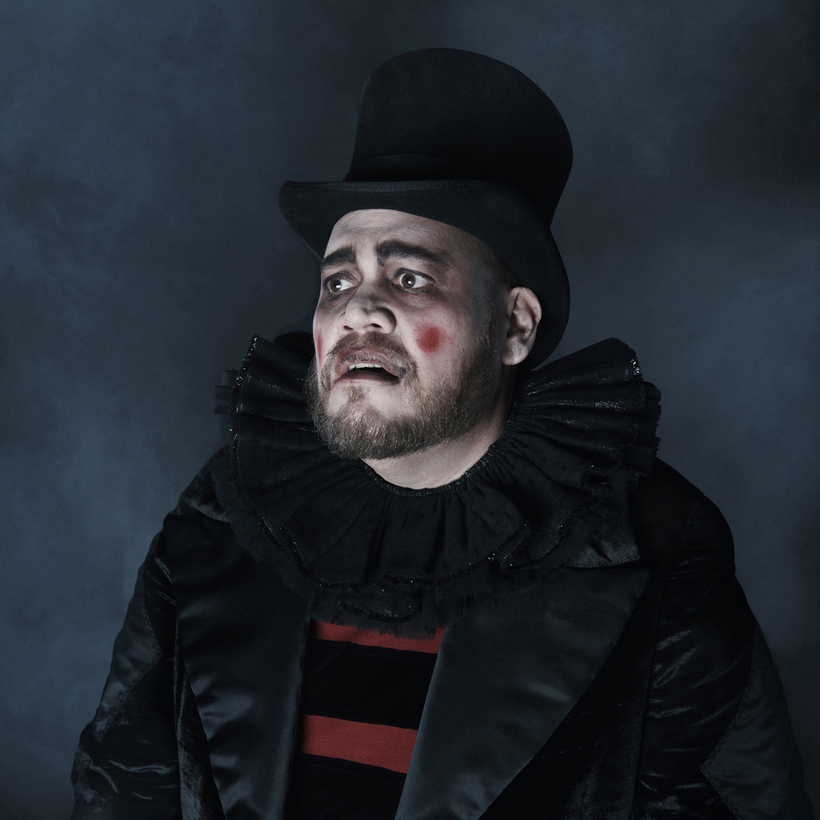Between kings, fathers, warriors, and buffoons, Giuseppe Verdi created quite the gallery of star vehicles for baritones who could meet his requirements. Which are? In 2019, an interviewer at the Chicago radio station WFMT put the question to Sherrill Milnes, the last of America’s great 20th-century Verdi baritones, and to Quinn Kelsey, widely hailed as his long-overdue heir presumptive for our time. Kelsey, who went first, spoke of vocal qualities such as nobility, broad color, and weight. Milnes zeroed in on high notes and stamina. Let’s add to these, if we may, refinement in phrasing, vivid projection of the text, an instinct for character and drama. Kelsey has the whole kit.
“There are two kinds of song,” a distinguished concert artist once told a cello student who was having a hard time unlocking the heart of his music. “Love songs and pirate songs. Which is this?” For singers, the answer may not be so cut and dried. Kelsey’s burnished tone, with its heart-on-sleeve shimmer at the crest of a soaring phrase, gives everything he sings the glow of romance—even the brawny, hell-raising passages when mischief’s afoot. His steadiness of line (no pushing, no reaching, no yelling) conveys an innate chivalry, dignified yet charged with coiled energy ready to strike with lightning speed.
All the great Verdi operas and most of the lesser ones feature a leading or even a starring role for the baritone. Authoritative avatars have been scarce for some time. On the global stage, this century’s first was the silver-maned Dmitri Hvorostovsky, of Siberia, much missed since his death, at 55, in 2017. Now it is Kelsey, 43. For the past decade, Verdi has been the constant in his datebook, accounting for some dozen roles, with prizes such as Nabucco, Macbeth, Un Ballo in Maschera, La Forza del Destino, and Otello yet to be claimed.
In November, I caught up with Kelsey in Zurich, where he had just opened the season as the war-like Count di Luna in Il Trovatore. Next summer, he takes the rollicking but melancholy title role of Falstaff in Santa Fe. More immediately, he turns to the very different title role of the mordant court jester driven to murder in Bartlett Sher’s new Rigoletto at the Metropolitan Opera, which had its gala premiere last night, on New Year’s Eve.

MATTHEW GUREWITSCH: How would you describe your affinity with “Joe Green,” as I keep hearing American singers call Giuseppe Verdi?
quinn KELSEY: Whoever Verdi had in mind when he wrote the baritone roles, he and I are very similar in how our voices behave. No, that’s too much. What I mean is that my mature voice was meant for this repertory. I’ve been singing Verdi solid for the last 10 years. And eight years ago, I was at the point that I didn’t have to go to a coach or a teacher to work a new role into my voice or to understand it dramatically. I could take what I had done in the last new role and apply it to the current new role, and everything just fell into place.
M.G.: How much of the job is singing, and how much is acting?
Q.k.: I follow the text, and the singing happens by itself. You have to go all in on the character. It’s the only way you get the audience to believe what you’re doing. I want people to forget that they’re sitting in an opera house watching Quinn Kelsey sing. Sure, I recognize my colleagues on the stage. But the performance is more of a success for me if I forget who they are, and all I see are the characters. It’s like the first time I watched The Birdcage, and halfway through the movie I forgot that I was watching Robin Williams. He delves so deep into characters, and you’re so happy to forget and just go down that rabbit hole with him. That’s what I want on the stage, and what I try to do.
M.G.: You did a pandemic video for Hawaii Opera Theatre that very surprisingly included a big Mozart aria, from Le Nozze di Figaro, and a bigger one by Rossini, from Il Barbiere di Siviglia. And it sounded to me that if you wanted a day off from heavy lifting in Verdi, those lighter, nimbler operas would be an excellent fit. How would you feel about that?
Q.K.: I was looking forward to those roles when I came out of the young artists’ program at Lyric Opera of Chicago. And long ago, I had a prominent company in Europe offer me Le Nozze di Figaro and Don Giovanni in the same season.
M.G.: Can you tell me, in confidence, which company?
Q.K.: Sure—it was [one of Europe’s top five].
M.G.: Wow.
Q.K.: That’s what I said, and dammit, Matthew, I couldn’t take the offer because I was busy doing something else. But if that isn’t a huge pat on the back. Yeah, we’ll hire you and pay you to sing these roles! Nice to know not everyone had written me off for Mozart!
M.G.: Looking in a different direction, you’ve also sung your first big-gun Puccini, the police chief Scarpia, in Tosca.
Q.K.: That’s a lovely fit. The vocal production isn’t exactly the same as in Verdi, but it sits really well and allows me to use all my strengths. It adds another facet. I’ve always been of the mind to be as versatile as possible. So, I’d also like to hold onto the bel canto stuff I sing, other Italian and French roles—and then to open the door to the German rep, Wagner and Strauss, and even Russian. But I don’t want anybody to get the wrong idea. Joe Green takes really good care of me.
A new production of Verdi’s Rigoletto, starring Quinn Kelsey, is on at the Metropolitan Opera, in New York, through June 11
Matthew Gurewitsch writes about opera and classical music for AIR MAIL. He lives in Hawaii

